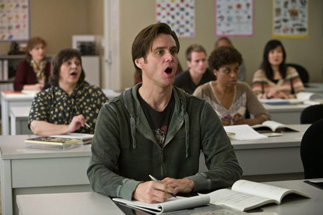|
|
Book vs. Movie: Yes ManBy Russ BickerstaffDecember 29, 2008
The Book On the very surface of things, Yes Man is yet another in a growing line of autobiographical one year-long project books. It's a weird sub-genre of nonfiction wherein the author agrees to do something somewhat restrictive for an entire year. In 2001, Kevin Murphy agreed to watch a film in a theater every day of the year for his book A Year At The Movies. In 2004, Julie Powell spent a year making every recipe from a Julia Child cookbook and out came Julie & Julia. More recently, A. J. Jacobs spent a year following the Bible as closely as possible, resulting in The Year of Living Biblically. With Yes Man, Danny Wallace chose a relatively simple year-long project that nonetheless ended-up effecting his year in a very invasive way. During a casual conversation on a London bus, a stranger told Wallace to say yes more often. Wallace took the offhanded comment to heart and decided to spend a year saying only yes to every single question posed to him. The project ends up guiding Wallace through a series of gradually more and more difficult series of yeses that have bigger and bigger effects on his life. From agreeing to a service he doesn't need from a telemarketer to paying for round trip airfare from Australia to the UK for a woman he's attracted to, Wallace's yeses take him from casual freelance work with BBC radio to a substantial promotion working as a producer with BBC TV. There are a few negative effects that result from some of his yeses. He has some of his first experiences with narcotics through saying yes. He gets alarmingly close to being ripped-off by Internet scams simple better judgment would have normally steered him away from. The overall effect of the project on Wallace's life is generally quite good. While not specifically designed as an inspirational book, (the US publisher categorizes Yes Man under, "humor,") the overall theme here revolves around the power of positivity. Thankfully, Wallace's writing style comes across with far more heartfelt and honest conviction than most inspirational writing ever manages. Yes Man ends up being sort of an inspirational book for people who normally wouldn't dream of venturing into the self-help section of a bookstore - a positive message that is effectively delivered by what appears to be Wallace's genuine desire to change his own life.
[ View other columns by Russ Bickerstaff ]
[ View other Book vs. Movie columns ]
[ Email this column ]
|

|
|
|

|
Friday, November 1, 2024
© 2024 Box Office Prophets, a division of One Of Us, Inc.


